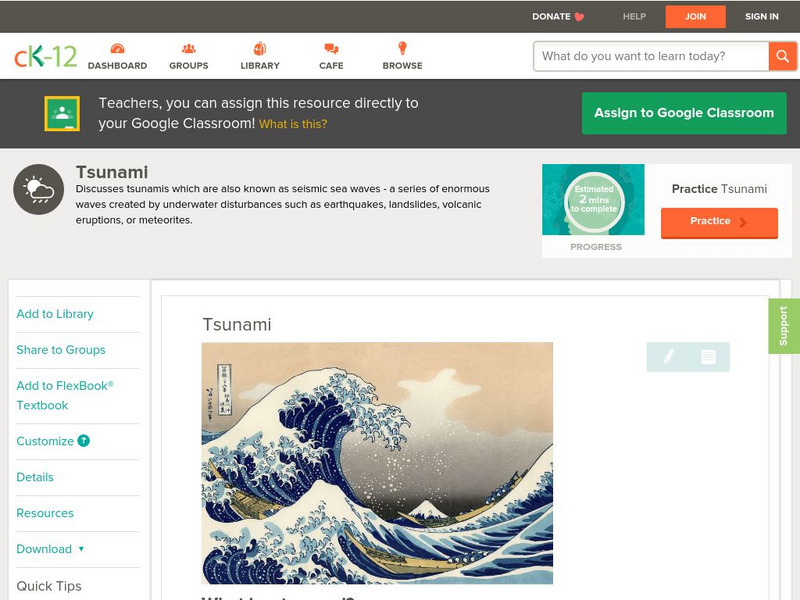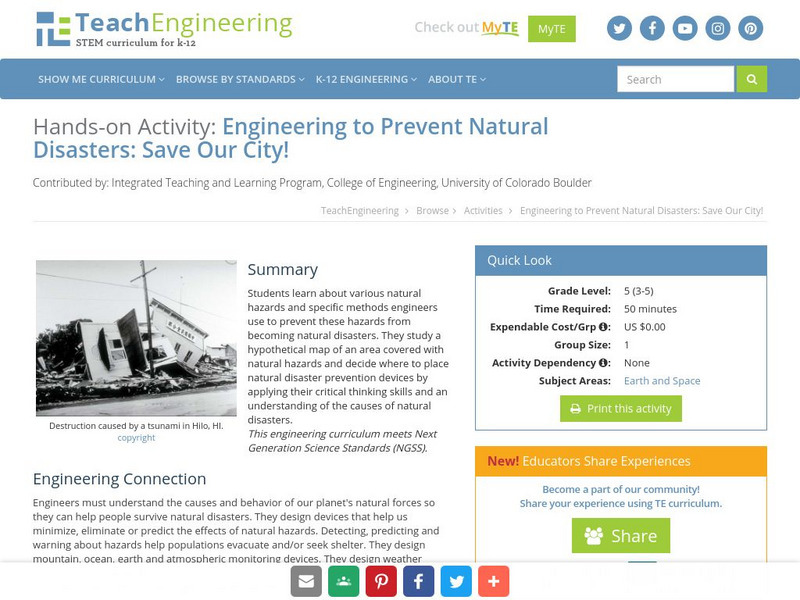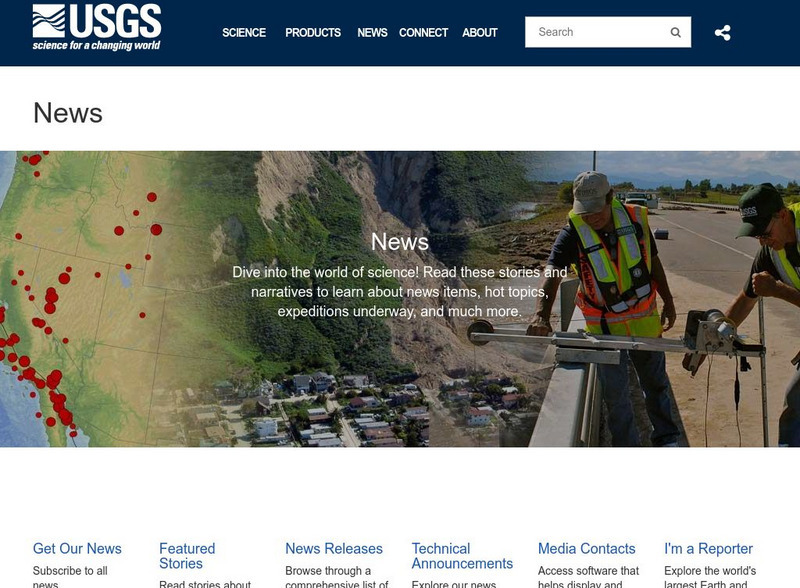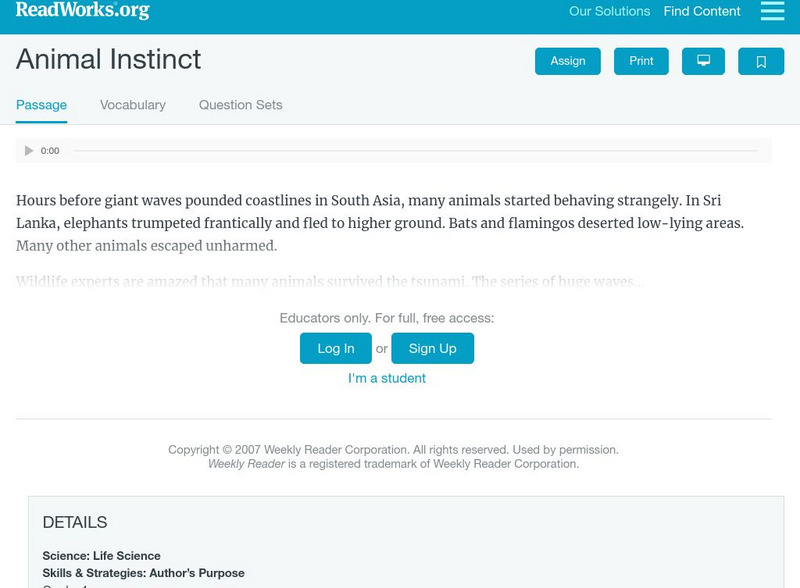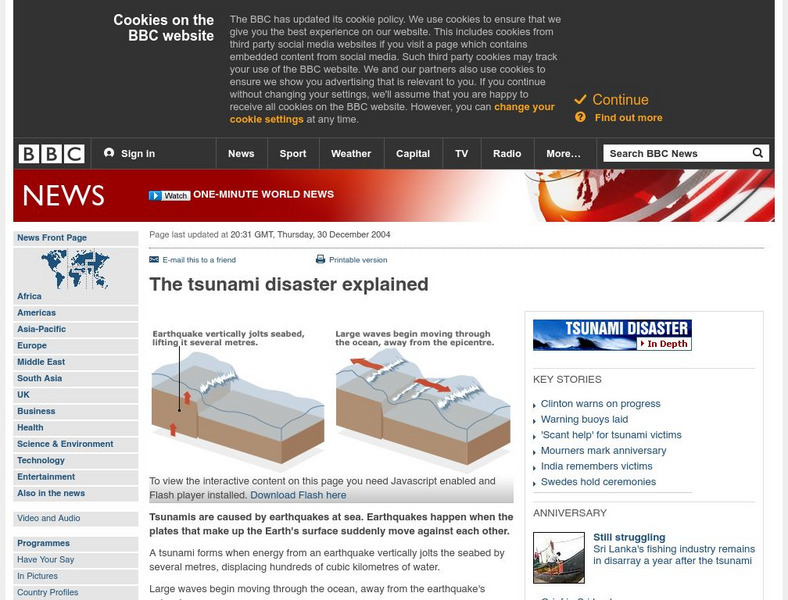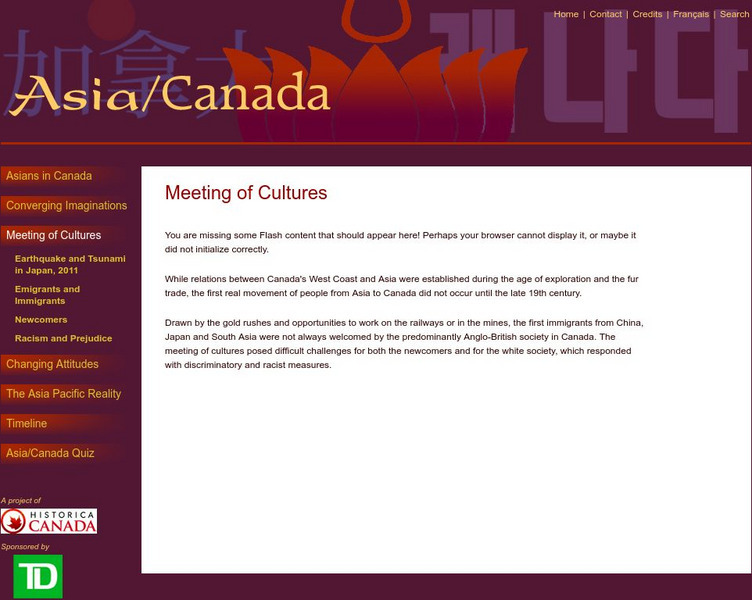Other
Oxfam International: 2004 Indian Ocean Tsunami [Pdf]
This web page offers information on Oxfam's program to aid those impacted by the 2004 tsunami in South Asia. PDF
US Geological Survey
Usgs: November 29, 1975 Kalapana
Describes details of the earthquake of November 29, 1975 Kalapana in Hawaii, the tsunami, and the eruption of the volcano Kilauea as a result of the earthquake.
US Geological Survey
U.s. Geological Survey: Life of a Tsunami
Animations illustrating long-lasting tsunami waves once they strike a coast.
Columbia University
Scientific Background on the Indian Ocean Earthquake and Tsunami
This site features information and related links that can be used by students and scientists to understand the events that led to the December 2004 Indian Ocean tsunami.
Discovery Education
Discovery Education: Dynamic Earth, Tsunami
Use this site to teach your students what a tidal wave or tsunami is from this lesson plan. The discovery activity shows how a tsunami happens.
CK-12 Foundation
Ck 12: Earth Science: Tsunami
[Free Registration/Login may be required to access all resource tools.] Covers how tsunamis occur.
Natural History Museum
Natural History Museum: Volcanoes and Earthquakes
As an online exhibit from the Natural History Museum, this site provides three videos on natural processes of Earth. The videos cover tsunamis, earthquakes, and volcanoes.
TeachEngineering
Teach Engineering: Save Our City!
Students learn about various natural hazards and specific methods engineers use to prevent these hazards from becoming natural disasters. They study a hypothetical map of an area covered with natural hazards and decide where to place...
TeachEngineering
Teach Engineering: Naturally Disastrous
Students are introduced to natural disasters, and learn the difference between natural hazards and natural disasters. They discover the many types of natural hazards - avalanche, earthquake, flood, forest fire, hurricane, landslide,...
TeachEngineering
Teach Engineering: Checking the Surf
This lesson introduces the concepts of wavelength and amplitude in transverse waves. In the associated activity, students will use ropes and their bodies to investigate different wavelengths and amplitudes.
US Geological Survey
Usgs: 2004 Deadliest in Nearly 500 Years for Earthquakes
The USGS provides the facts and figures on 2004's earthquakes, which is the second most fatal in recorded history.
CK-12 Foundation
Ck 12: Earth Science: 21st Century Tsunami
[Free Registration/Login may be required to access all resource tools.] Covers the consequences of recent tsunamis.
Read Works
Read Works: Starting Over
[Free Registration/Login Required] Students read about rebuilding after a disaster. A question sheet is available to help students build skills in comparing and contrasting.
Read Works
Read Works: Animal Instinct
[Free Registration/Login Required] Students read about animals that seem to instinctively know when a natural disaster is about to happen. A question sheet is available to help students build skills in author's purpose.
Read Works
Read Works: Quake in Indonesia
[Free Registration/Login Required] An informational text about a series of earthquakes on the island of Sumatra in 2007. A question sheet is available to help students build skills in reading comprehension.
BBC
Bbc: The Tsunami Disaster Explained
The BBC explains how the South Asian tsunami disaster happened with an animated map.
Soft Schools
Soft Schools: Quizzes: Wild and Weird Weather
Think you know all there is about tsunamis, tidal waves and tornadoes? Take this wild and weird weather quiz to test your knowledge!
NPR: National Public Radio
Npr: Tsunami Devastates Asian Nations
The main page for NPR coverage of the Asian Tsunami of December, 2004. Stories from Sri Lanka, India, Thailand, as well as coverage on other aspects of this disaster. 12/2004
Other
Asia/canada: Meeting of Cultures
Asians immigrants have had to battle hardship and prejudice to make new lives for themselves in Canada. That path is described here as well as the defining moments that politicized Chinese Canadians and acted as catalysts towards...
US Geological Survey
Usgs: Tsunami & Earthquake Research
The USGS provides an extensive section of information about tsunamis. The items presented are the basics of tsunamis regarding the Great San Francisco earthquake of April 18, 1906, tsunamis in the U.S. Pacific Northwest, and the 1998...
Other
Pacific Tsunami Museum: Home Page
This site from the Pacific Tsunami Museum provides a very extensive FAQ sheet that answers many questions about tsunamis, a tsunami picture of the month, and additional links to related topics.
NOAA
Noaa: International Tsunami Information Center: Tsunami, the Great Waves
National Oceanic and Atmospheric Administration defines a tsunami and links to related pages about what causes tsunamis and how lives can be saved from their devastation.
PBS
Wnet: Thirteen: Savage Earth: Waves of Destruction, a Tsunami Animation
View a brief animation that explains the science behind a tsunami.
Other
University of Wisconsin Green Bay: Faults and Earthquakes
This site is primarily set up as an outline and is loaded with graphs, maps, and images. It covers a variety of earthquake-related topics, such as what causes earthquakes, fault lines and structures, seismology, a historical look at...


![Oxfam International: 2004 Indian Ocean Tsunami [Pdf] PPT Oxfam International: 2004 Indian Ocean Tsunami [Pdf] PPT](https://d15y2dacu3jp90.cloudfront.net/images/attachment_defaults/resource/large/FPO-knovation.png)


